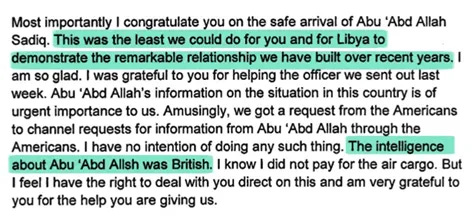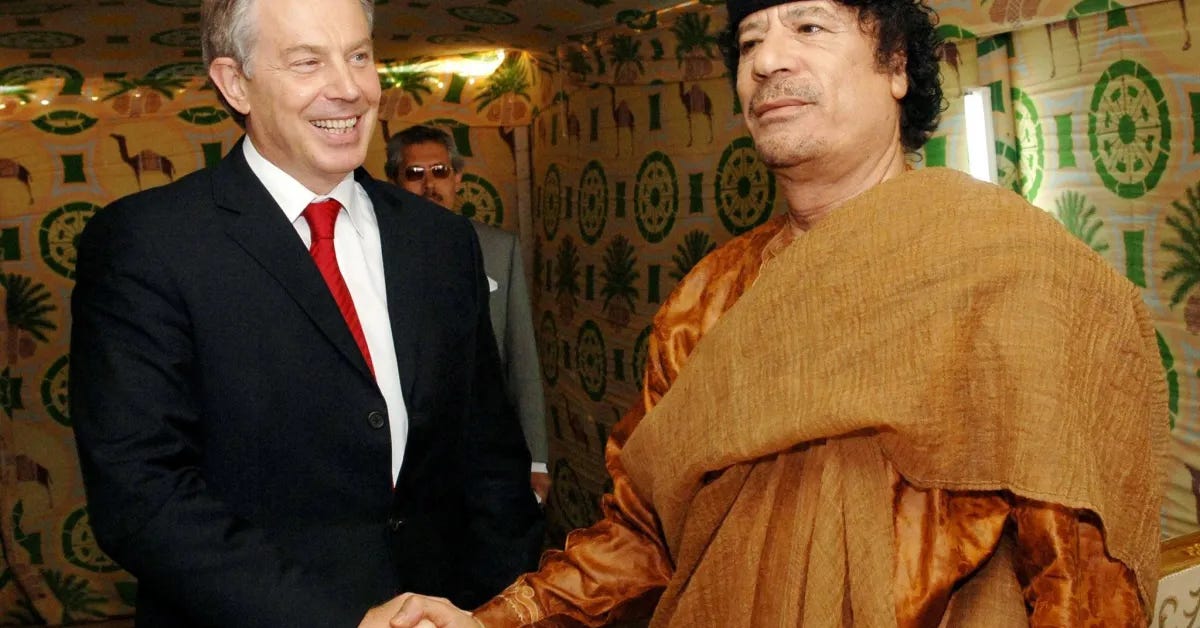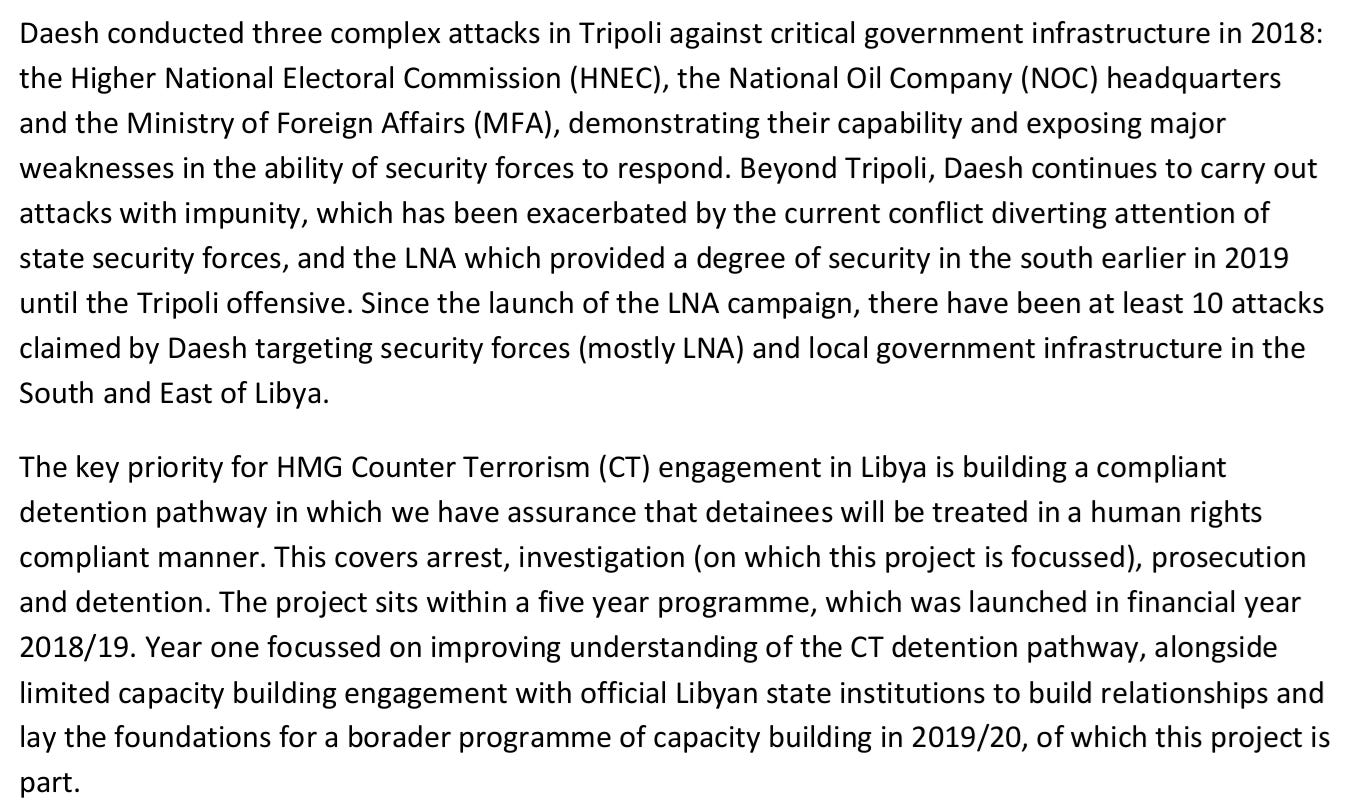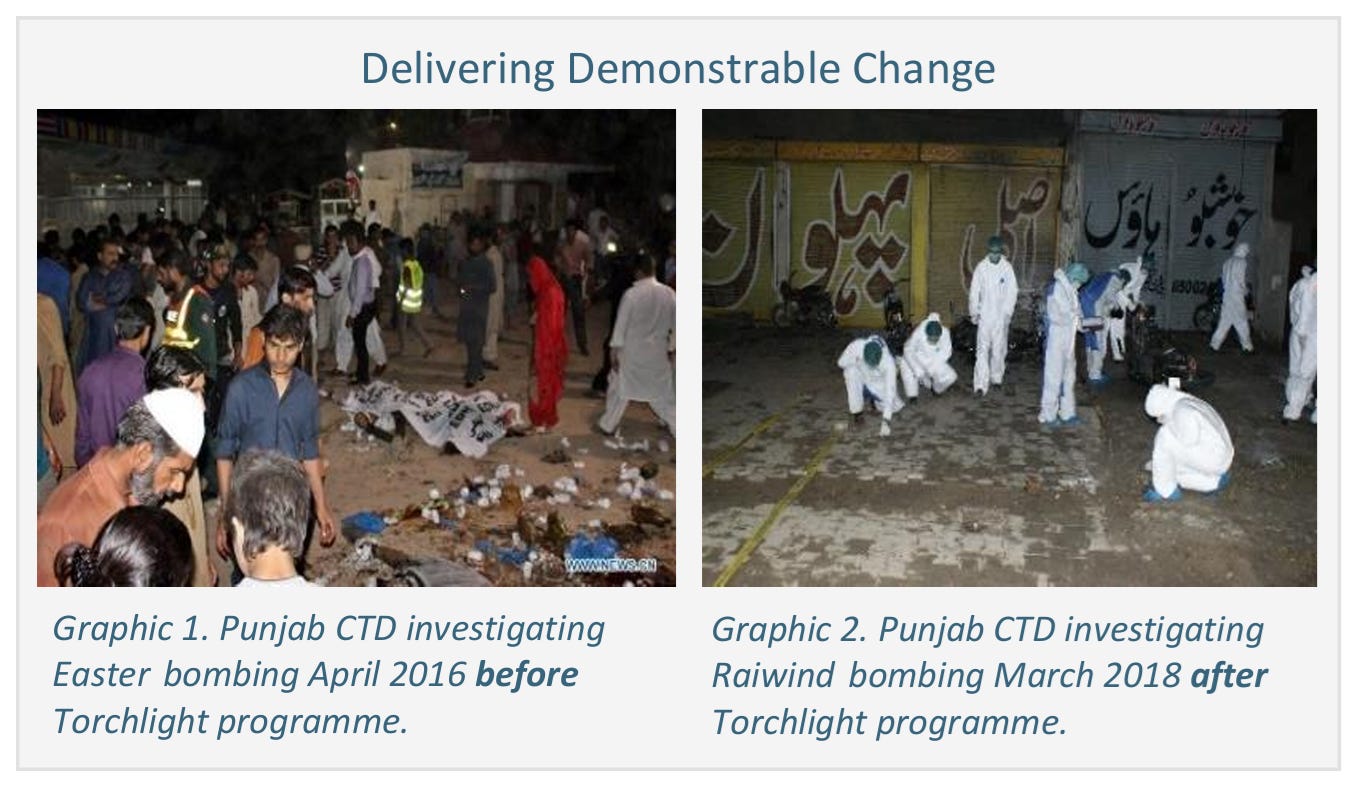For King and BP: How MI6 Infiltrated Libya
All my investigations are free to read, thanks to the generosity of my readers. Independent journalism nonetheless requires investment, so if you value this article or any others, please consider sharing, or even becoming a paid subscriber. Your support is always gratefully received, and will never be forgotten. To buy me a coffee or two, please click this link.
In early March, Libya launched an “oil and gas licensing roadshow”, seeking to “drum up interest” among international investors, and boost its oil production by 50%. Subsequently, representatives of Tripoli’s UN-recognised National Unity Government (GNU), and state-owned National Oil Corporation, have toured cities across the US and Europe, making “in-depth” presentations on the voluminous riches local oligarchs and corporations could potentially reap locally. It’s the first time the country has opened up exploration of its vast energy reserves to overseas bidders since 2007.
This development represented the culmination of a lengthy, extremely fraught effort by British intelligence to create a stable milieu for US and European corporations to operate in the country, following NATO’s destructive 2011 bombing campaign, and the repulsive televised murder of Tripoli’s longstanding leader Muammar Gaddafi. London’s preponderant financial interest in crushing Gaddafi’s nationalist, Pan-Arabist rule was openly admitted before he was even sodomised to death with a bayonet by fighters of the Western-backed National Transitional Council that October.
The previous month, then-British Foreign Secretary William Hague began lobbying the UN to lift arms restrictions on Tripoli, to facilitate London’s sale of weapons to the NTC, including its military wing and self-appointed national police force. Not long after, junior defence minister Gerald Howard explicitly proclaimed, “we liberated Libya from a tyrant, frankly I want to see UK business benefit from the liberation we’ve given to their people.” Chief among the intended beneficiaries was BP.
Following thawing of relations between Britain and Libya during the War on Terror, a time when Tripoli’s security services were regularly used by the CIA and MI6 to torture terror suspects under the auspices of “extraordinary rendition”, Tony Blair met with Gaddafi in a desert tent in 2007. The British Prime Minister paid fawning tribute to the longtime leader, hailing how his country had been radically “transformed” from “an outcast” into a committed, dependable Western ally.
By Blair’s side was BP chair Peter Sutherland. He subsequently announced his company would return to Tripoli over three decades after Gaddafi went to war with European and US energy giants active in the country, expropriating and/or nationalising their assets on the basis they unfairly profited at the expense of his state and people. These moves greatly improved the local population’s standard of living, to the extent that by 1979, average per-capita income in Libya exceeded Britain and Italy.
While Sutherland looked ahead to raking in tens of billions from BP’s newfound deal with Libya, and Blair considered warming relations with the country “one of the key foreign policy successes of his premiership,” the pair’s grand plans were put on ice following the outbreak of insurrectionary violence in Tripoli in February 2011, immediately “prior to the commencement of drilling operations” by BP. It was not until May 2012 Britain’s leading energy giant sought to restart its “exploration” of the country’s vast energy reserves.
This was three months before the NTC formally handed over power to Tripoli’s newly-elected parliament and government. It was widely anticipated this rapid transition to Western-style democracy would immediately produce an environment conducive to foreign investment. Almost instantly though, Libya descended into total chaos, with rival militias, warlords and political factions bitterly battling for control. Assassinations, attacks on foreign embassies, sectarian clashes and civilian massacres became a daily staple, while ISIS established strongholds throughout the country.
BP was thus forced to put its Libyan ambitions on indefinite hold yet again, as disarray reigned supreme. One might think the subsequent emergence of two parallel governments that both to this day claim control over Tripoli - the GNU, and Libyan National Army-backed Government of National Stability - would complicate matters further. However, in the intervening time, British intelligence covertly intervened in the country’s bloody bedlam so decisively, its operatives crafted a sufficiently stable space for BP to resume operations at long last, in October 2024.
‘Central Governance’
Leaked documents reveal British intelligence ran a variety of programs in post-war Libya using private sector cutouts, first and foremost Torchlight Group. This journalist has previously exposed how the company trains repressive security forces in countries such as Jordan in digital dark arts practiced by GCHQ’s JTRIG, and comprehensively infiltrated West Asian intelligence agencies on London’s behalf. Torchlight’s Tripoli operations were officially conducted in the name of “stability”, but it’s clear their ultimate concern was protecting Libyan economic assets from attack.
One leaked file, dated March 2018, states Britain’s “commitment to playing a leading role in ensuring Libya transitions to a stable country remains high.” As such, the Foreign Office constructed “a coherent package” of “support” aimed at “stabilising and reconstructing Libya,” to be delivered by contractors like Torchlight. Of chief concern was “establishing new interventions on the economy and local governance.” A “counter-terrorism development programme”, costing half a million pounds January - March 2019, loomed large among London’s considerations.
A leaked accompanying tender notes ISIS “conducted three complex attacks in Tripoli against critical government infrastructure in 2018.” Among their targets was Libya’s National Oil Corporation headquarters. This was of grave concern to the British, as it demonstrated “major weaknesses in the ability of security forces to respond” to strikes on the country’s economic infrastructure. So, Torchlight penetrated Libya’s Internal Security Service, Criminal Investigations Department, and Attorney General’s Office, to ensure a “compliant detention pathway” for “terror” suspects, covering “arrest, investigation…prosecution and detention.”
The project sought to “build the capacity” of all three agencies, “while reinforcing the close working relationship between them,” to support a shift “from confession-based to evidence-based prosecutions.” Torchlight would clandestinely teach Libyan security services “UK best practice” on “counter-terror investigation policy and practice.” This included “overt/covert, forensic, analysis, comms, digital, media” evidence gathering, and “the use of special investigative techniques,” including “HUMINT [human intelligence], surveillance, intercept, covert search, tracking, digital, control delivery, participation prison intelligence, etc.”
Tripoli was expected to learn how to “[develop] evidence from intelligence leads,” along with “suspect handling and interview techniques,” the ultimate goal being “developing a specialist cadre of [counter-terror] prosecutors to build capability/capacity to receive the improved evidence,” and “the Libyans to establish a core [counter-terror] Senior Investigative Group.” This would comprise “intelligence agencies, police and prosecutors,” while the country adopted “a joint investigative leadership model” mirroring Britain’s own Executive Liaison Group, which draws together counter-terror police and MI5, London’s domestic spying service.
It was hoped Britain’s investment would reverse “instability in Libya” that had erupted since Gaddafi’s 2011 fall, which allowed “extremist groups to thrive,” by exploiting “permissive environments”. Meanwhile, “the authority of the Government of National Accord,” the GNU’s forerunner, was reportedly “frequently contested”. Such conflict, “combined with long-term economic stagnation and weak state security forces,” amply demonstrated Tripoli’s “lack of central governance”, and its susceptibility “to capture” by armed militias, “in some cases with the acquiescence of the locals.”
‘National Security’
In leaked submissions to the Foreign Office, Torchlight outlined in some detail how it was ideally placed to train Libyan police and security and intelligence services to identify and neutralise individuals and groups who posed a threat to the operations of BP and other major Western corporations in the country. For one, the firm boasted extensive experience of conducting comparable “institutional change and organisational development” operations on behalf of British intelligence, in 70 separate countries.
Moreover, Torchlight had already carried out several clandestine British-bankrolled projects in preceding years, training Tripoli’s criminal investigators and prosecutors. This granted the firm “significant contextual knowledge of the operating environment within Libya.” Such “long-term mentoring” efforts also engendered personal “rapport” between Torchlight operatives and individuals in positions of significant power and influence within the Internal Security Service, Criminal Investigations Department, and Attorney General’s Office. These bonds could thus be exploited to secure “buy in” for London’s secret “counter-terrorism development programme” in the target agencies.
Torchlight further bragged of having “assembled a highly competent and experienced delivery team that exceeds the requirements set out for delivery” of the project. This included numerous individuals with lengthy backgrounds in sensitive fields back in Britain. For example, a 30-year senior police veteran assigned to the initiative had already trained Libya’s CID in “IT systems and competency, cybersecurity, fundamentals of intelligence and analysis, utilisation of covert human intelligence sources, open source intelligence, data management, databasing, indexing, social media intelligence…phone data analysis” and more.
He was one of several Torchlight operatives in possession of an “enhanced security clearance” in Britain. Another was the program’s senior political economy advisor for the program, British ambassador to Libya 2015 - 2018 Peter Millett. His time in the post meant he had “particularly strong” personal relationships with multiple senior government officials in Tripoli, which he leveraged to secure the extradition to London of Hashem Abedi, brother of purported Manchester Arena bomber Salman Abedi.
Hashem was subsequently convicted of 22 charges of murder, for allegedly helping his brother source materials used in the May 2017 attack. An official inquiry into the mass casualty bombing blamed the Abedis’ father Ramadan, a member of the Al Qaeda-affiliated, MI6-sponsored Libyan Islamic Fighting Group for radicalising the pair. The probe made no reference to the role played by MI5 in actively facilitating the travel of British-based LIFG fighters - including several members of the Abedi family - to Libya in 2011, specifically to topple Gaddafi.
The inquiry was also bereft of references to a trove of documents discovered in abandoned Libyan government offices following the “revolution”. This included highly incriminating communications sent to and from MI6’s then-counter terror chief Mark Allen and his counterpart in Tripoli in March 2004, regarding the kidnap and subsequent torture of terror suspect Abdel Hakim Belhaj and his pregnant wife. Not long after those exchanges, Allen retired and joined BP’s board as special adviser on Libyan oil contracts.

In May 2015, six months after resigning as MI6 chief, John Sawers likewise joined BP’s board. The sinister revolving door between Britain’s foreign spying agency and its largest international energy company is never subject to serious scrutiny by the mainstream media. Moreover, there are unambiguous indications this dark alliance is subject to concerted coverup at the highest levels.
In May 2007, the Daily Mail published an incendiary exposé based on the testimony of a former senior BP staffer in charge of securing lucrative contracts in Azerbaijan, following the collapse of the Soviet Union. They alleged millions were spent using company credit cards on champagne, drugs, prostitutes and debauched parties for local government officials. They further claimed MI6 was well-aware of and encouraged these activities, working closely with BP to win business and “influence the political complexion of governments” in the region.
The bombshell story was retracted without explanation within hours of publication, allegedly by direct British government decree, and has since sunk without trace. Were it not for the leaked files detailed here, the public would likewise remain in the dark today about the extent to which London’s foreign spying apparatus, which supposedly defends Britain’s “national security” in the name of King and country, is in fact primarily concerned with making the Global South safe for Western economic rape and pillage.






Interesting that Daesh were seemingly attacking BP's/SIS's interests, given that Daesh is an American-supported operation...
So much for the special relationship.
I'm always wondering what's really happening there, cause all anyone here says is "it was the richest place in Africa but it's got slavery now" and that's it, over simplistic narrative.